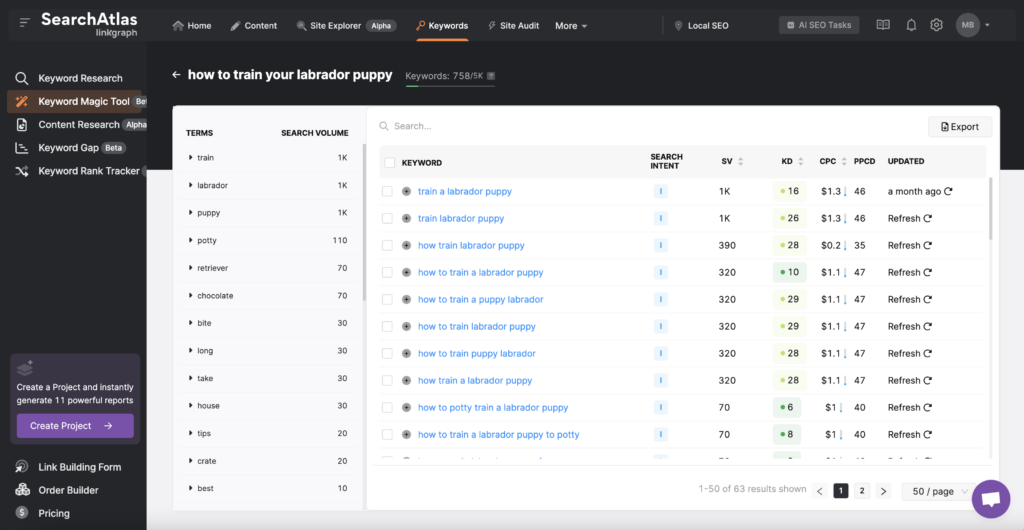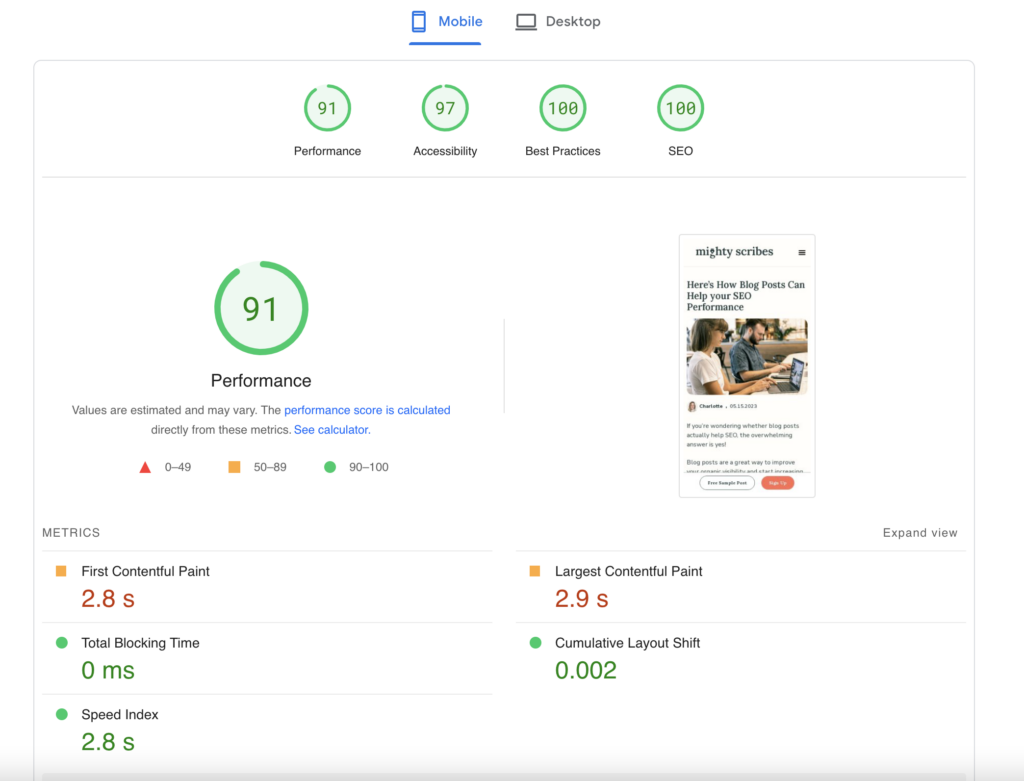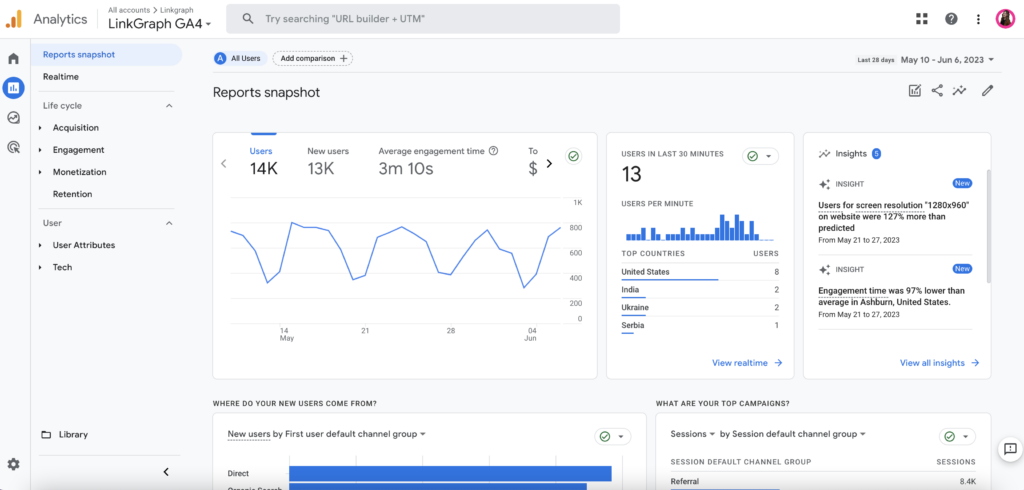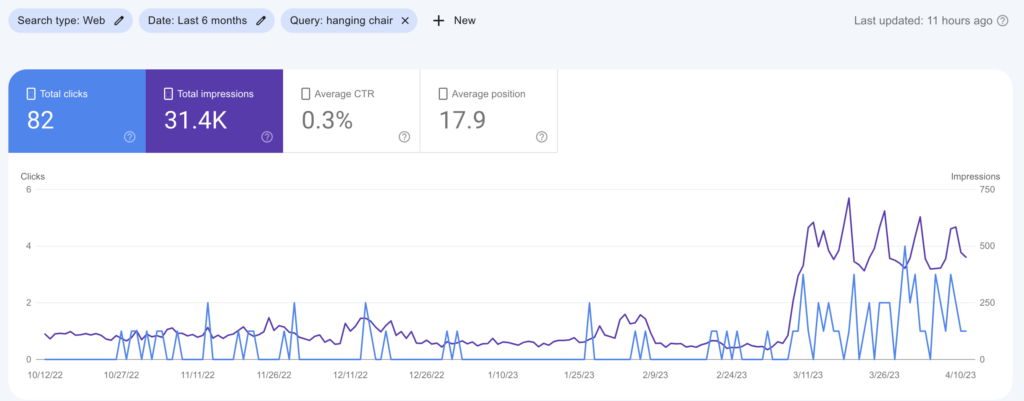So, you want to maximize your blog’s potential and earn more revenue through search engine optimization (SEO). But how exactly do you do that? No worries! We’ve got you covered! At Mighty Scribes, our team of writers has mastered the art of content marketing and search engine optimization. We create top-ranking blogs to drive organic clicks and conversions to your site.
In this article, we’re providing you with 12 expert tips on blog writing that will help boost your SEO performance and ultimately increase your website traffic, sales, and revenue. Keep reading to learn how you can boost your blog’s performance and drive organic traffic using the best blog writing tips for SEO.
Why Optimize My Blog Posts for SEO?

We live in a world where search engines rule. So, it’s crucial to make sure your content ranks well on search results if you want to attract more traffic to your website. Blog posts can improve your site’s organic visibility, but it doesn’t happen overnight!
Google looks for optimized SEO blogs that are well-written, helpful, relevant, and authoritative. Once you check all of these boxes, you’ll notice an increase in the number of organic clicks as well as more visitors to your site. Investing in a blog strategy is worth the effort, and having optimized blog content earns you a better rank in search engine results.
How Do I Write a Good Blog Post for SEO?
To make sure your blog post reaches the right audience, you need to optimize it for search engines. Here are the basics of writing a good post step by step:
- First, you’ll need to conduct keyword research to identify the best search terms that your target audience is most likely to use. You can find a keyword research tool to learn more about the best keywords for your chosen industry and topics.
- Then, choose a target keyword and incorporate it throughout your post. Remember that SEO copywriting is not about keyword stuffing. It’s about writing quality content that aligns with user intent.
- Next, your blog writing should focus on providing value to your readers while also being structured for SEO.
- Lastly, use subheadings to break up your content into easily consumable chunks. Incorporate transition words, and write in a listicle format where possible.
The best way to ensure high-quality content is to hire an experienced blogger to do all of this on your behalf. SEO blog writers are well-versed in SEO strategy and can write relevant content that is easily readable and utilizes the right keywords to help your page rankings. Check out the following section for the best blog writing tips for SEO.
13 SEO Tips for Optimizing Blogs
As a business owner, your marketing strategy can make or break your site’s performance. By incorporating these 12 SEO tips for optimizing blogs, you can drive more traffic to your landing pages, product pages, and blog posts overall.
1. Plan your content using the best keywords
For SEO, it’s essential that you include relevant keywords and phrases in your blog posts. This will help search engines understand the content of your blog post. The more relevant content you have on your website, the more opportunities you’ll have to rank higher in SERPS.

To start, identify the main topics or themes of your blog posts. Think about the words and phrases that people might use when searching for information related to those topics. And avoid using generic terms that are too broad.
2. Publish high-quality content with effective titles
High-quality content is key to bringing in traffic to your blog. So, your blog should be well-structured, easy to read, informative, and use engaging titles.
To create high-quality content, make sure your blog is well-structured. This means your content should be organized in a way that makes it easy for readers to scroll easily and digest. Use headings, subheadings, bullet points, and numbered lists to help break up large chunks of text. You want your readers to be able to find the information they are looking for quickly. You also don’t want them to feel lost or confused while reading your blog!
When it comes to page titles remember that these will form the blue, clickable result in the SERPs. Make sure they are engaging and relevant to your topic!

These blog writing tips for SEO will make your content more readable, and it will also make your content look more professional overall.
3. Think about mobile optimization
Nowadays, most users visit websites on their phones. So, your blog should be readable and fast-loading on mobile devices. No one wants to stay on a site that doesn’t make sense visually or takes too long to load!
You’ll have to use a responsive theme that enables your blog to be viewed on all devices, meaning your blog will adapt to any screen size or device type. This quality will make your content more accessible to users on the go, and enhance their overall experience on your website.
Also, use a tool like PageSpeed Insights to measure load times on mobile. Aim for scores 90 and above.

4. Utilize internal and external linking
Links play a huge role when it comes to blog writing tips for SEO. Internal linking has to do with linking your blog post to other pages on your website. External linking involves linking to other relevant pages on external sites. By linking to other relevant posts on your site, you encourage your readers to spend more time on your website, increasing the chances of them converting into loyal fans. Internal linking also helps search engines understand the structure and hierarchy of your site.
When you use external sites, you’re basically demonstrating to search engines that your blog is part of a larger online community. When you link to high-quality websites, this increases your credibility and authority, which can lead to better search engine rankings.
However, if you link to low-quality or spammy websites, Google will take notice. Make sure you pay attention to what websites you are linking to, and avoid any websites that are irrelevant, spammy, or unsafe for users.
5. Encourage readers to share your content
You’ll also want to encourage readers to share your blog on social media by including social media icons in your blog. You can do this by including calls to action at the end of your blog posts, like “Share this post with your friends if you found it helpful!” This increases your blog’s visibility, and it also helps to establish your credibility as a go-to resource for valuable information.
6. Create an SEO-friendly meta description
Meta descriptions are a short summary of what your post is all about. The ultimate goal is to create a compelling summary that will capture the attention of your readers. To do this, you have to use relevant keywords and phrases in your meta descriptions. It will help search engines understand what your post is all about and make it easier for your readers to find the information they’re looking for. One of our best blog writing tips for SEO is that you should keep it short, sweet, and to the point; it should also be no longer than 160 characters.
7. Use header tags for better organization
Use headings to break up your content and make it easier to read. These nifty little HTML tags allow you to break up your content into digestible sections, making it easier for your readers to navigate and follow along. But it’s not just about the reader’s experience, search engines also use header tags to understand the structure and hierarchy of your content.
8. Understand your target audience using Google Analytics
Google Analytics allows you to analyze your site traffic in detail as well as identify the sources of your traffic, the demographic of your visitors, and the behavior of your visitors. With this information, you can make well-informed decisions to improve the user experience and, ultimately, lead to increased traffic and conversions.

For example, if you’re getting a lot of traffic from social media, you can focus on your social media marketing strategy to bring in even more visitors. Make sure you utilize these blog writing tips for SEO to get the best results.
9. Regularly update your blog and add to older posts
Trust us when we say that Google loves nothing more than fresh and engaging content! So, you’ll likely want to have several blog posts on your website before you start earning traffic. Then, you’ll also want to update your blog on a regular basis as this is a great way to keep it at the top of the rankings. This means your blog will be seen by more people, which helps increase your visibility and builds your audience over time.
10. Incorporate long-tail keywords into your content
Instead of simply focusing on generic keywords, try using specific, long-tail keywords to help your blog rank higher on search engines. Using long-tail keywords means you’re targeting niche phrases. For example, instead of targeting the keyword “baking,” target “vegan baking recipes” or “gluten-free baking tips.” This way, you’ll be targeting a more specific audience and increasing the chances that your blog post will show up in search results for those specific terms.
11. Utilize Google Search Console to track your search performance
Google Search Console is a powerful tool that allows you to track your blog’s search performance.
With this tool, you can see how your posts are ranking on Google search pages. You can also see the queries people use to get to your website. This information is invaluable because it enables you to improve your content for more traffic.

One of the best features of Google Search Console is its ability to submit your sitemap to Google. A sitemap is a file that lists all the pages on your blog, and submitting it to Google helps the search engine to index your site better. This way, Google can crawl your blog content conveniently, which increases the chances of your blog appearing in search engine results pages. These are just one of the many useful blog writing tips for SEO.
If you’re looking for even more comprehensive SEO performance tracking, consider GSC Insights by Search Atlas.
12. Don’t forget to use appropriate images and alt text
If your images aren’t properly optimized, they’ll slow down your website’s loading speed. This can negatively impact both user experience and rankings.
One of the ways to remedy this is by using appropriate alt tags or descriptions. Alt tags or descriptions are HTML attributes that provide descriptive text for an image. They help search engines understand the content of your images and improve your website’s accessibility for visually impaired users.
Make sure every image on your website has a descriptive and relevant alt tag. It should have relevant keywords and accurately describe what the image is about. Avoid using generic descriptions like “image” or “picture.”
Optimizing your images’ file names can also improve your website’s rankings. Instead of using generic names like “IMG001,” use descriptive and relevant names that include relevant keywords. This allows search engines to understand your image content and also helps users find them easily.
13. Keep publishing blog content regularly
When it comes to blog writing tips for SEO, one important question to ask yourself is “How many blog posts do I need?”
Unfortunately, there’s no universal answer to this question. The truth is that it largely depends on your particular situation. Some businesses may achieve their goals with just a few posts, while others may need dozens or even hundreds to see results.
But the reality is, there are likely hundreds to thousands of ways that potential customers are searching for products or services like yours. Creating blog content that answers all of their questions and explores all the various subtopics related to your industry is the best way to rank for all of those searches.
So do your best to make blog writing a consistent part of your content strategy. And as you write, check out these tips for SEO copywriting to make sure you are making the most of your content for SEO. Or consider hiring content writing professionals to tackle your blog content for you.
Conclusion
Altogether, these 13 blog writing tips for SEO are crucial for enhancing your SEO performance and earning more revenue. By implementing these tips, you’ll have a better chance of going up higher in search results, attracting more traffic to your site, and ultimately generating more earnings through your writing. Don’t just focus on improving your writing skills, take the time to master these SEO techniques and reap the rewards of a successful blog.
Of course, if you’d prefer to leave it to the experts, the Mighty Scribes team is ready to help!







